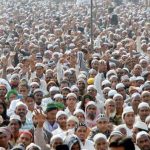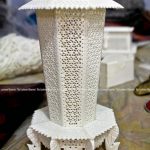Palestinian Lessons in Life
Rafeef Ziadah is a third-generation Palestinian refugee and a captivating spoken word artist. Her music and poetry is inspired by socio-political themes like migration, war and, of course, the return to Palestine.
Rafeef’s debut album Hadeel is dedicated to Palestinian youth, who still fly kites in the face of F16 bombers, who still remember the names of their villages in Palestine and still hear the sound of Hadeel over Gaza.
She has never seen her homeland, Palestine, but her passion and longing for her cultural heritage is clearly evident in her emotional performances. She recalls the oddity of her situation.
See, it is strange for us Palestinian refugees, because we haven’t actually lived in Palestine. But Palestine has lived in us since we were children, which is a huge difference.
Most of her poems reflect both her frustration and sorrow at the Palestinian struggle against occupation. Her first public performance was in 2004 in reaction to an incident during a creative action demonstration. During the demonstration, students recreated a checkpoint with Israeli soldiers and Palestinian civilians.
“I was one of the citizens lying on the floor, being Palestinian,” Rafeef says.
A Zionist came by and kicked her right in the gut and said, ‘You deserve to be raped before you have your terrorist children’.
The deeply felt hatred from the student was both shocking and disgusting to her.
“The only way I could deal with it was to write back,”she says. The resulting poem, Shades of Anger resists the racist remarks of the student, while also signifying her refusal to back down quietly. Since her poetic debut, she has done much over the past decade to raise awareness of Palestinian suffering, both the oppression within Palestine as well as Palestinian displacement across the globe.
“My family are refugees to Haifa,” she says. “But part of my family are internally displaced inside Israel.”
Rafeefa was born in Beirut. Some of her first childhood memories are of the 1982 siege and bombing of Beirut. After that her family left Beirut and were always traveling around being stateless Palestinians, constantly deported from one country to the other, until she finally settled in Canada.
Although she has never visited Palestine herself, she lives with deeply entrenched memories of her elders.
Most people in exile miss a place that they know but she misses a place that she does not know.
“We miss a place that we just hear about and it is a home that we are told of and I think it’s holding onto that idea that we have a home and that we will return to our home, which is what I try to hold onto in all my work and to speak about in all my poems.”
Today the likes of Rafeefa are clear about what they want. It is freedom, justice and equality. Nothing more and nothing less.
She does not want to be defined by what she is against. Of course, she is against the occupation of Palestinian land by Israel, against colonialism, against apartheid. But, what she likes to talk about most is what she is for which is justice and freedom for all Palestinian people, and for everyone who actually lives in that area.
When she says freedom, justice and equality, she does not speak just of the West Bank and the Gaza strip, but for all Palestinians wherever they are.
The immediate demand is for Palestinian refugees right to return, the equal treatment for Palestinian citizens of the Israeli state, an end to occupation and the dismantling of the apartheid wall. Anything less than that would not be justice for Palestinians.
To the question if Israelis and Palestinians may one day live peacefully with each other, Rafeefa says that this is not a question of people being unable to live together. What is important is the situation under which they live, because all sorts of people have lived in Palestine for centuries.
The problem started only after the creation of Israel as a homeland only for Jews. That is racism. Racism is to say you can live but not you. Till all human beings are treated equal and in a just manner nothing will be resolved.
To force people out of their home is the problem. To look upon another’s suffering is the problem.
The biggest problem is the normalisation of Palestinian suffering when people no longer think that the pain of Palestinians is abnormal. This is a very abnormal situation, but it is not making people angry, and that is strange.




